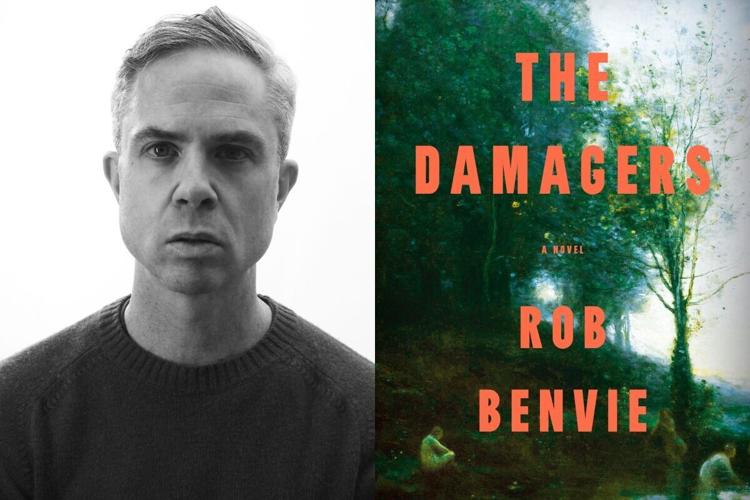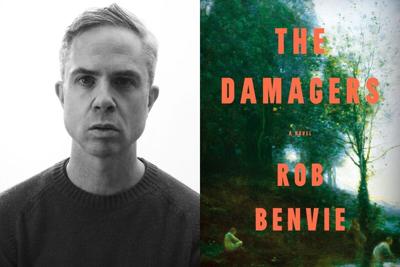Power tends to corrupt, as the adage goes.
But what if corruption is in fact a prerequisite of power? What if the pursuit and exercise of control actually depends on an outsized ego and a natural willingness to embrace self-serving cruelty?
ŌĆ£To be a leader of people, you have to be a little bit of a sociopath, a little bit insane,ŌĆØ said Rob Benvie, the ╬┌č╗┤½├Į musician and author whose new novel ŌĆ£The DamagersŌĆØ (Knopf Canada) grapples with questions about how power is generated and wielded, and seeks to understand why we so often end up with ŌĆ£buffoonsŌĆØ and ŌĆ£charismatic weirdosŌĆØ in charge.
Set in upstate New York in the early 1950s, ŌĆ£The DamagersŌĆØ tells the story of two girls╠²ŌĆö Zina and her younger sister Presendia╠²ŌĆö who are forced to flee to the Adirondack Mountains following a tragedy that left their familyŌĆÖs farmhouse consumed by flames. After a harrowing trudge through darkness, the girls arrive at a lakeside camp populated by misfits and runaways. Reclusive, hedonistic and vaguely spiritual, the community is revealed as a sort of a New Age congregation led by a brooding but magnetic leader named Peter. Eventually, Peter adopts Zina as his╠²prot├®g├®, and tasks her with transforming his revolutionary visions into scripture.
But over the course of a tumultuous year, Zina╠²discerns cracks in the communeŌĆÖs ostensibly egalitarian edifice, and stumbles upon secrets that betray the misogyny at the root of Peter’s philosophy.
ŌĆ£The DamagersŌĆØ is a gripping and propulsive novel, filled with absorbing philosophical interludes, psychedelic drug trips and stark moments of violence. BenvieŌĆÖs prose is muscular and heady, reflecting the grandiose visions of his characters, for whom romantic idealism is perhaps the only antidote to the alienation of a rapidly industrializing society.
And though ŌĆ£The DamagersŌĆØ was inspired by the utopian community movements of the postwar era, BenvieŌĆÖs exploration of power dynamics feel remarkably relevant to our current political climate.╠²
ŌĆ£We live in a time where human nature is so laid bare in our politics,ŌĆØ said Benvie, a founding member of the alt-rock band Thrush Hermit, noting that he began writing the novel during the first Trump era, ŌĆ£a time when petty grievances and fantasies and narcissistic behaviours were on display by the people in charge all the time.ŌĆØ
ŌĆ£The DamagersŌĆØ provides no easy answers, but offers a provocative illustration of what Benvie called╠²ŌĆ£the tug-and-pull between self-realization and the collective good.ŌĆØ
What did you last read and what made you read it?

Rob Benvie says he just finished both W.G. SebaldŌĆÖs “Vertigo” and Simon CritchleyŌĆÖs “Mysticism.”
I usually have two or more books on the go at once, and I just simultaneously finished W.G. SebaldŌĆÖs “Vertigo” and Simon CritchleyŌĆÖs “Mysticism,” which made for some groovy concordances. But right now I have a stack facing me that includes Thom HolmesŌĆÖs “Electronic and Experimental Music: Technology, Music, and Culture”; Paul GriffithsŌĆÖ “Modern Music and After: Directions Since 1945”; and Mark PrendergastŌĆÖs “The Ambient Century: From Mahler to Trance ŌĆö The Evolution of Sound in the Electronic Age” ŌĆ” all because IŌĆÖm writing a novel about people driven insane by synthesizers. Fun stuff!╠² ╠² ╠²
What book would your readers be shocked to find in your collection?
Surprising? Maybe, maybe not. But an essential resource for any creative type is Salvador DaliŌĆÖs “50 Secrets of Magic Craftsmanship.” So much crucial wisdom! The chapter titles alone are unimpeachable. Chapter 11: ŌĆ£The secret of a telescope constructed with the AristotleŌĆÖs lantern of a sea urchin by virtue of which the painter may know when he must stop working at his picture.ŌĆØ Chapter 23: ŌĆ£The secret of the reason why a great draughtsman should draw while completely naked.ŌĆØ And, of course, chapter 43: ŌĆ£The secret whereby a painter may become a very rich man, that is to say, whereby he may produce gold with his colors.ŌĆØ Who needs grad school?
When was the last time you devoured a book in one, or very few, sittings?
I recently read Maurice BlanchotŌĆÖs “Death Sentence” over a couple of lunch breaks. Consuming that one in a subterranean food court in the bowels of the Financial District was kind of trippy.
WhoŌĆÖs the one author or whatŌĆÖs the one book youŌĆÖll never understand, despite the praise?

Rob Benvie calls Rick Rubin╠²“the Deloitte of the music business.”
“The Creative Act: A Way of Being” by Rick Rubin. Rubin had approximately three good concepts 35 years ago and has since made millions cultivating this identity as a sort of mindfulness guru for bands whoŌĆÖve run out of ideas. Labels book him as insurance against their shaky investments for the kind of dazzling insights he shares in this book, such as ŌĆ£To create is to bring something into existence that wasnŌĆÖt there before.ŌĆØ HeŌĆÖs basically the Deloitte of the music business. If you go home with someone and find this on their bedside table, do yourself a favour and call an Uber pronto.
What’s the one book that has not garnered the success that it deserves?
IŌĆÖd be hard-pressed to╠²say what it means for a book to have ŌĆ£success.ŌĆØ But a lot of interesting books could be considered failures. One is Malcolm LowryŌĆÖs “Hear Us O Lord from Heaven Thy Dwelling Place.” Everyone knows “Under the Volcano,” and rightfully so, because itŌĆÖs wicked. But Lowry, despite his seemingly endless capacity for self-ruin, produced a lot of other stuff, most unpublished during his lifetime. Much of the writing in this posthumous collection is annoyingly overwrought, and you can sense within it a deep-seated resentment against, like, everything. ItŌĆÖs almost unreadable and itŌĆÖs great.
What book would you give anything to read again for the first time?
One nice (albeit tragic) side effect of getting old is that as your storage capacity for cultural absorption becomes maxed out, things youŌĆÖve already read a few times can feel new. Mark FisherŌĆÖs “The Eerie and the Weird”╠²is one of those jams where you can feel uncharted chambers of your brain opening as you read it. FisherŌĆÖs stature seems to have only risen in the years since his death, and for good reasons ŌĆö his books remain poignant, consistently enlightening and fun. So IŌĆÖll probably reread it soon and itŌĆÖll be just like the first time.╠²
When you were 10 years old, what was your favourite book?
As a spirited young lad, I was obsessed with Gordon KormanŌĆÖs “Who Is Bugs Potter?” ItŌĆÖs the story of a dweebish, self-conscious young kid named Adam who befriends the dauntless rock drummer Bugs Potter ŌĆö I longed to be Bugs, even if my natural disposition was more like AdamŌĆÖs. Reading that book set me on a decades-long foray into rock ŌĆśn’ roll delusion that IŌĆÖm still clawing my way out of.

Rob Benvie would like to hang out with Jean des Esseintes, from Joris-Karl HuysmansŌĆÖ “Against Nature (├Ć rebours).”
What fictional character would you like to be friends with?╠²
Jean des Esseintes, from Joris-Karl HuysmansŌĆÖ “Against Nature (├Ć rebours).” We could hang out smelling flowers and spritzing perfume at each other while lamenting the inaccessibility of true decadence in these decrepit times. Now thatŌĆÖs my idea of a party!╠²╠² ╠²╠²
Do you have a comfort read that you revisit?
Every Christmas the family and I curl up around the fire and read RZAŌĆÖs “The Wu-Tang Manual” together. New delights reveal themselves each and every time.╠²
What was the last book that made you laugh or cry?
IŌĆÖm not really a big laugher or crier ŌĆö more one to chortle appreciatively or fret inwardly, consumed in the mire of minor agonies. But IŌĆÖll take this opportunity to shout out Spencer GordonŌĆÖs “A Horse at the Window,” which came out last year. ItŌĆÖs a collection of super-funny, consistently enervating quasi-monologues that vehemently exists both in the right-now and in the eternal. ThereŌĆÖs also a Buddhistic aspect to it that, while somewhat beyond my own dismally unenlightened mind, I can feel rubbing off on me as I read. And yeah, I laughed.

Rob Benvie calls╠²“A Horse at the Window” “a collection of super-funny, consistently enervating quasi-monologues that╠²vehemently exists both in the right-now and in the eternal.”
What is the one book you wish you had written?
Rupi KaurŌĆÖs “milk and honey.” I live in downtown ╬┌č╗┤½├Į, and these mortgage payments are killing me!
What three authors living or dead would you like to have a coffee with?
Elfriede Jelinek, Jean Rhys, and Arthur Schopenhauer. WeŌĆÖd wile away the time staring into our (potentially spiked) cups in stony silence.
What does your definition of personal literary success look like?
ŌĆ£To crush your enemies, see them driven before you, and to hear the lamentations of their women.ŌĆØ ŌĆöConan the Barbarian




































To join the conversation set a first and last name in your user profile.
Sign in or register for free to join the Conversation